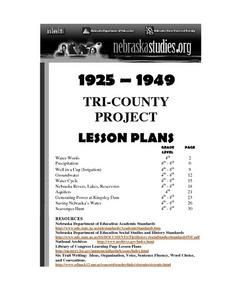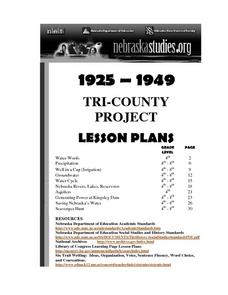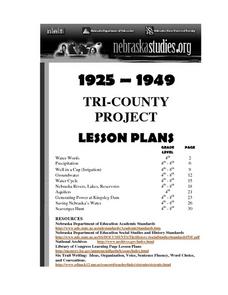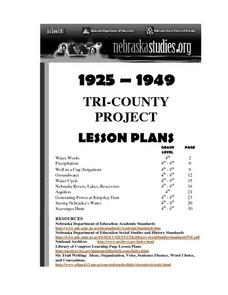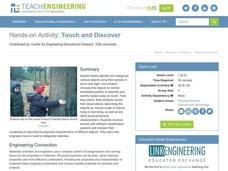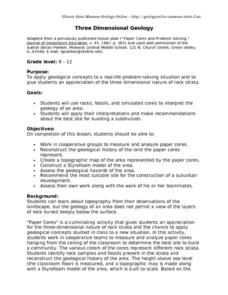Curated OER
Owl Pellets: A Fowl-Up, Chuck!
Students discover the world of owls as predators. After watching a video of owls hunting and eating, are introduced to owl pellets. Students dissect their own pellet and match the prey's bones to a bone diagram.
Curated OER
Water Quality and Nitrates & Phosphates
Students examine the effects of nitrates and phosphates on the dissolved oxygen levels in different water sources. In this series of 3 lessons, they consider the reasons for nitrate and phosphate level increases and their effects on...
Curated OER
"Tri-County" Project--Ground Water
Students explore data on some of the landforms in Nebraska to distinguish between porous and nonpremeable soils. The state's groundwater is investigated.
Curated OER
"Tri-County" Project--Ogallala Aquifer
Students explore the Ogallala Aquifer in the state of Nebraska. The signs of pollution found are examined and the data classified.
Curated OER
"Tri-County" Project--Rivers Lakes Reservoirs
Students examine data about the rivers, lakes, and reservoirs in the state of Nebraska. An understanding of the political implications of boundaries is developed.
Curated OER
Tri-County Project: Precipitation
Students examine and research the annual rainfall in Nebraska. They create a map of the annual rainfall in Nebraska and use the map to develop explanations of settlement.
Curated OER
"Tri-County" Project--Water Cycle
Students analyze the parts of the water cycle through research and experimentation. Particular attention is paid to the processes of evaporation and condensation.
Curated OER
"Tri-County" Project--Well in a Cup
Young scholars construct a model of a well to identify how water is brought to the surface. Signs of pollution are investigated.
Curated OER
Scientific Approach to Forest Management
Pupils use wireless laptop computers to collect, store, communicate, and organize data from the 1999 Jasper Fire area. They collect data in the field and compare it to student-collected data from prior years to develop conclusions about...
Curated OER
The Interactive Periodic Table of the Elements
High schoolers study the different types of metals. In this investigative lesson students watch a demonstration on the effects of temperature on atoms and take a tour through baone matter.
Curated OER
Baa, Ram, Ewe.... Sheep Tales
Students explore animal characteristics by reading animal stories in class. In this sheep habitat lesson, students identify the uses for sheep in our agricultural based society and the importance of wool in our economy. Students read...
Curated OER
FIELD NOTE SCAVENGER HUNT
Learners explore how to take good field notes through a scavenger hunt.
Curated OER
People Who Work in the Woods
Students study the types of jobs that people can do in the forest. They examine those who study the forest, harvest the trees, and plant trees to renew the forest.
Curated OER
Outdoor Education
Students read about the future, wildlands, tropical forestry, rocky mountains and more. For this outdoor education lesson plan, students read each article and complete an activity at the end.
Curated OER
How Does Your Garden Grow?
Students explore plant life by reading books about gardening. In this botany lesson, students read the books From Seed to Plant and Oh Say Can You Seed? while identifying the necessary elements to raising a healthy plant. Students view...
Curated OER
Touch and Discover
Students work together to identify and categorize objects. They have to identify the object on touch because they are blindfolded. They record their data and describe the objects once they can look at them.
Curated OER
Rock On
Fourth graders create a powerpint presentation to inform their classmates about a selected type of rock. Students are divided into groups to research a particular type of rock. Each group researches their topic using traditional and...
Curated OER
My Farm Web
Third graders explore agriculture by viewing video clips in class. In this farm animal lesson, 3rd graders identify the animals mostly eaten that come from farms and the types of food they consume before they are eaten by us. Students...
Curated OER
Food Travels and Preservation
Fourth graders study food processing and distribution. In this food processing lesson, 4th graders investigate various methods of food preservation. Students study methods of food distribution.
Curated OER
Eeks Beaks
Seventh graders examine the concept of adaptations that take place in the wild. Birds are the focus organism for this study. They examine the beaks of different birds and point out the differentiations.
Curated OER
Deforestation
Students identify the different tropical rainforests in the world using a map. In this ecology instructional activity, students describe the different methods of deforestation. They create a memo and present it to class.
Curated OER
Ecosystems
Sixth graders perform various labs, create presentations, and do hands on activities to explore the ecosystem.
Curated OER
Arkansas and Louisiana Purchase Wetlands
Students experiment to determine the value and importance of wetlands in Arkansas. They develop an environmental appreciation for wetlands.
Curated OER
Three Dimensional Geology
Students use rocks and fossils to interpret the geology of an area. They use prior knowledge and make recommendations about where to build a subdivision based on the rocks.





